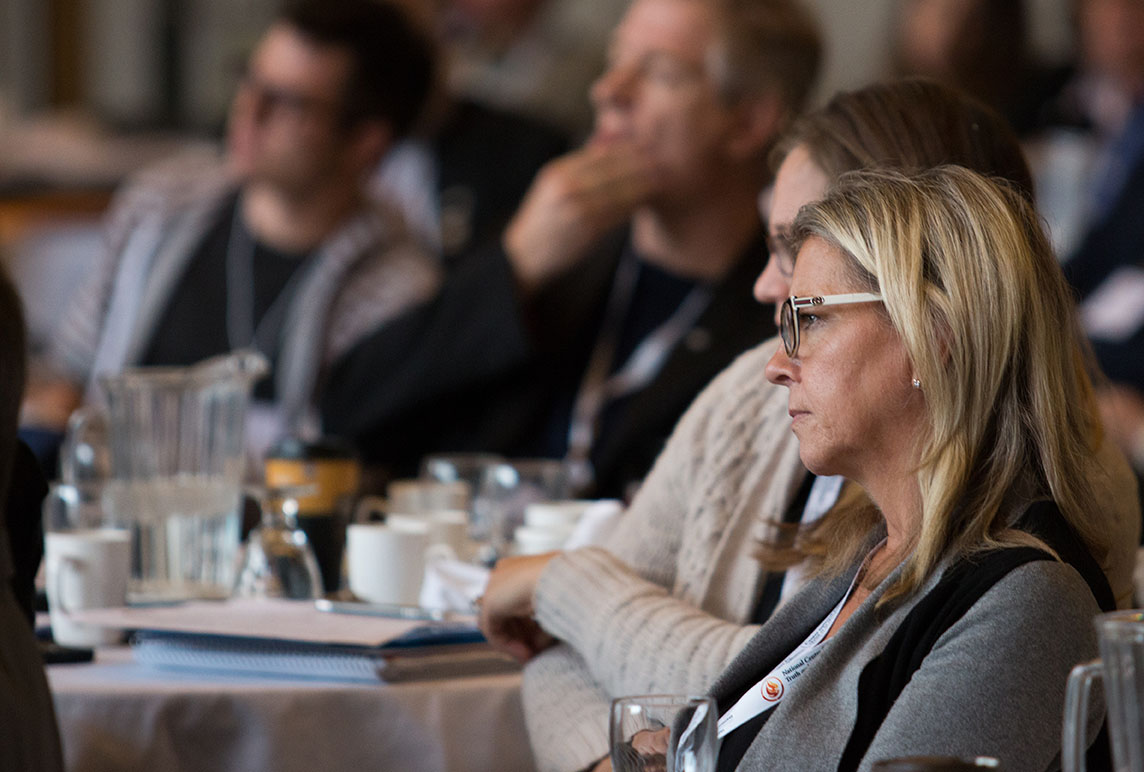Lisa Ford listens to the speaker at the conference. Photo by Caitlin Taylor
Written by Madina Azizi
After attending Reconciliation and the Media conference, Lisa Ford can bring the understanding and passion she used to advocate for women in male-dominated newsrooms to advocating for better coverage of residential schools.
Lisa Ford is the station manager and news director at Global News Saskatoon. She is a 30-year veteran and has received many awards, a most recent and prestigious award being Honours of Excellence from Lethbridge College. She is a feminist who is passionate about issues concerning women and equality rights and consistently fights against gender roles and stereotypes.
For example, while visibly pregnant, Ford insisted on reporting on-air, despite receiving negative feedback from the audience.
Even before she attended the conference, Ford knew that women were not the only victims of injustice. “Working in media, we are exposed to racism against Indigenous people all the time,” she said.
Ford is aware of white privilege and understands that her experiences were a result of this privilege. However, that’s not to say that she has never faced discrimination.
When asked why she is passionate about Reconciliation and the Media, Ford said that she supports all human rights and equality. “Being a female in a male-dominated profession, when it comes to leadership, it also helps fuel that passion, because I have experienced the discrimination myself.”
Ford spent part of her childhood growing up in North Central Regina, once referred to as “Canada’s Worst Neighborhood” in Maclean’s, due to its high crime rate. Living in that neighborhood allowed Ford to come into daily contact with Indigenous people. “Most of my friends were of Indigenous descent,” she said. “We were all just kids who hung out together.” Ford recalls, “I had no idea about the struggles some had gone through.”
However it wasn’t too long before her relatives exposed her to their negative opinions. “I definitely had some racist relatives. I had trouble understanding it because as a child my friends were just my friends. But I did hear the racism.”
Ford was unaware of assimilation policies such as residential schools until she was much older. “I didn’t learn about residential schools until I was an adult because that shameful part of Canadian history was swept under the carpet,” she said.
With more than 30 years of experience in newsrooms, Ford feels that there is an absence of effective and objective news coverage of Indigenous issues. Nonetheless, she is passionate about bringing awareness to Indigenous issues and believes that because Indigenous people represent a recognizable portion of our society today, it is very important for that to be reflected in media.
“We need to reflect all of our community in the most truthful manner possible and the Indigenous community is a large part of our community,” she said. “It’s a community we need to support.”
In addition, Ford believes that it is time we move from ignorance to educating Canadians about the dark secrets of the past, such as residential schools. She says the conference is “a great starting point to get the conversation going.” Ford says she is “passionate about reconciliation and the media, because as journalists, we are responsible for telling the true, unaltered facts.”
Listening to stories from speakers at the conference had an impact on Ford. “I think what really struck me was listening to Eugene Arcand give his very emotional, firsthand account of what it was like to be taken away from his family and sent to residential school.”
“For the first time in my life I could really put my soul into that little boys heart and feel the fear. Until that, the stories of residential school survivors was always sad for me to read, but this was the first time I could truly feel what those children went through and could understand the impact, including PTSD and substance abuse later in life,” Ford said.
“And I could completely understand why this would be the result after going through such a terrifying experience.”
Ford has been advocating for women’s rights since she first stepped into a newsroom and continues to recruit and mentor female journalists. Alyson Edwards who now works with the Saskatoon Police, was one of the journalists that Ford guided. “I’ve known Lisa for more than 25 years,” Edwards says. “Lisa is most passionate about her role in guiding and mentoring journalists.”
Now Ford is using all her feminist advocacy experience towards reconciliation with Indigenous people.
“We need to educate our readers and viewers about Canada’s true history to help all Canadians understand the struggle and terrible impact residential schools have had on generations of families. The more knowledge everyone has, the more we can step closer to truly understanding and reconciling.”











